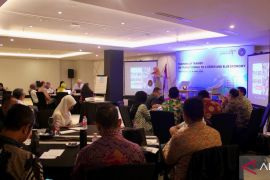Marine protected areas which effectively managed can support the fishing industry and marine eco-tourism that can be achieved through fishery production stability, and protection to small fishermen. This movement can be done through area zoning system, tourist income, and increased community tourism economy. Therefore, the inauguration of MPAG is a concrete movement from government to balance the level of utilization of fish resources and people welfare in coastal area, while still maintain the needs of future generations. "The conservation developed by MMAF is not restricted to protect and conserve marine resources and fisheries, but also to give attention to the utilization aspect in a controlled manner to maintain its sustainability," said Sharif.
Furthermore, Sharif called for the activities carried out within the framework of MPAG to be well-coordinated and synergized by both policy and government programs, and focus on activities in an achievement of development and management of marine conservation areas. For that reason, MMAF is working on the establishment of a mechanism to manage sustainable funding (Trust Fund) to support the management of protected area. "The establishment of Trust Fund will make easier for us to manage grant funding from our partners, so that utilization can be more transparent, focused and on target", Sharif continued.
Related to this matter, the Government of Indonesia welcomes the support of USAID through MPAG program to support the achievement of National Plan of Action (NPOA) target which included in the framework of Coral Triangle Initiative (CTI). Along with that, MMAF and local government will actively continue to design and direct the programs supported by USAID, so each activity will be appropriate with the government policy and targets. Marine Protected Areas Program is expected to support Indonesia's commitment to realize the target of marine protected areas of 20 million hectares in 2020.
This partnership program between Indonesia and United States are implemented and escorted by five consorsium of non-governmental organization, including Conservation International, Coral Triangle Center, The Nature Conservancy, Wildlife Conservation Society, dan WWF of Indonesia. Until the middle of 2012, Indonesia has succesfully established marine protected areas of 15,5 million hectares 9ha) or 77,5 percent from the target of 20 million hectare in 2020.
In addition, on that occasion, the Declaration of Small Kei was also embedded as a new protected area. The development of that area is a part of MPAG program to achieve the government target in order to reach 20 million hectares of MPA. Managing Agency of Upstream Oil and Gas (BP Migas) is also took part to support the protected area approach by signing the partnership agreement as a form of its participation from private sector to the conservation effort.
Meanwhile, Chief of Party MPAG, Pahala Nainggolan, ensured that MPAG participate to support the commitments of several marine program based in sustainable development principals. Therefore, he continued, to operate MPAG programs, it needs a synergy between relevant stakeholders to work together in making the nechanism to manage marine protected areas. Various wide protected areas which managed by MMAF until today are Sawu Sea in East Nusa Tenggara (NTT), Raja Ampat Waters and Banda Sea.
The management of protected areas can not be separated from three key pillars, such as sustainable protection, conservation and utilization. It refers to the management objectives of protected areas based on zoning system such as core zone, sustainable fishery zone, utilization zone and other zone. At least, these efforts can be carried out through three management strategies, including environmental management through variety of conservation programs by implement protected areas as a driver of the economy, the tourism program of natural waters and sustainable self-financing as well as management of protected areas as a form of social responsibility which particularly conduct to the welfare of society.
For more information, please contact Indra Sakti, SE, MM, Head of Data, Statistic and Information Center, Ministry of Marine Affairs and Fisheries (Mobile: 0818159705)
Reporter: Okta
Editor: PR Wire
Copyright © ANTARA 2012










